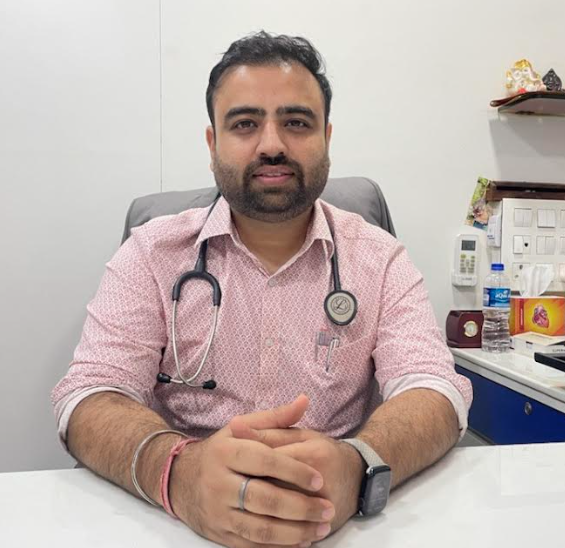 Diabetes is one of the major chronic diseases that consistently poses a threat to our healthcare system. Around 77 million people have type-2 diabetes in India, and over 50% are unaware of their condition, leading to further severe complications. The LGBTQIA+ community is at risk and needs to monitor and manage their condition to avoid premature mortality or morbidity.
Diabetes is one of the major chronic diseases that consistently poses a threat to our healthcare system. Around 77 million people have type-2 diabetes in India, and over 50% are unaware of their condition, leading to further severe complications. The LGBTQIA+ community is at risk and needs to monitor and manage their condition to avoid premature mortality or morbidity.
इनके बारे में जानें:
- Understanding diabetes
- Type-2 diabetes among LGBTQIA+ patients
- Factors making LGBTQIA+ patients vulnerable
- Ways to manage your diabetes better
Understanding diabetes
Diabetes is a chronic health condition that results from uncontrolled blood glucose levels. Diabetes can be of two types:
- टाइप-1 डायबिटीज: The inability of the pancreas to produce insulin efficiently. It is usually a condition developed at birth.
- टाइप-2 डायबिटीज: The inability of the body to use insulin effectively. Most cases in India are attributed to type-2 diabetes. Cells develop insulin resistance, preventing the body from responding to insulin normally. If untreated, it can cause multi-organ failure.
Type-2 diabetes among LGBTQIA+ patients
Unlike a few years ago, टाइप-2 डायबिटीज is not just common among adults over 40 years of age. It’s prevalent in different groups irrespective of age, gender and orientation. Coupled with the fact that LGBTQIA+ patients experience health disparities, they are often seen as a high-risk group when it comes to diabetes. This also means that they are at a higher risk of other severe diseases that are associated with unchecked diabetes.
Diabetes cannot be reversed, so it’s better to manage it effectively and avoid complications later on. Mismanaging or neglecting diabetes leads to a host of other chronic conditions that turn lethal. Some risks associated with diabetes are:
- कोरोनरी आर्टरी डिजीज
- Chronic kidney disease or kidney failure
- Diabetic retinopathy
- Neuropathy or nerve damage
- हाइपोग्लाइसेमिया (खून में चीनी/ग्लूकोज की कमी होना)
- Diabetes coma
Factors making LGBTQIA+ patients vulnerable

It is easy to overlook diabetes symptoms or associate them with other conditions. These symptoms can result from a variety of reasons ranging from age, genetics or other chronic conditions to factors like body image issues or the social stigma associated with being gay. However, certain common factors among the people in the LGBTQIA+ community put them at a higher risk for diabetes:
- Stress and lack of sleep
Dealing with social pressures and prejudices can be quite stressful on its own. This is topped with workplace stress and unrealistic expectations you burden yourself with. Stress affects every aspect of your life, including your health. Stress is also efficient in killing your sleep, which in turn adds to your risk of developing type-2 diabetes.
- Smoking or alcohol consumption
Dealing with stress and pressure, especially for queers, can quickly drive them to smoke or drink excessively. Along with other serious health complications, smoking can increase your risk of developing टाइप-2 डायबिटीज by 30-40% Since research suggests that more queer people smoke or use other tobacco products, it’s mainly a cause of concern.
- Poor eating habits
Whether it’s stress eating or poor diet due to body image issues, social stigma plays a role in poor nutrition. People from the LGBTQIA+ community end up having inadequate nutrition due to poor eating habits, increasing their risk of developing type 2 diabetes.
Ways to manage your diabetes better
Here are some tips to manage your diabetes effectively:
- Resting and managing stress
Handling social and workplace pressure can be exhausting. Practice mindfulness to declutter your mind. Meditation is a great way to relieve stress and sleep better at night. Rest adequately at other times. - Exercise and physical activity
Being physically active is a must for people with diabetes. Exercising 30-40 minutes regularly can improve hormone function and help manage your diabetes better. Additionally, it’ll rid you of body image issues as you become fitter. Choose an activity you like so you can stick with it for the long term. - Optimal nutrition
Your eating choices will dictate how well you succeed in your diabetes management. Your nutrition plays one of the most critical roles in checking your diabetes. You should avoid excess carbohydrates and sugary foods. Choose nutrient-rich foods like vegetables and fruits. Eat food rich in proteins and fibers. Most importantly, eat on time and avoid binging to prevent erratic insulin spikes. - Monitoring blood glucose levels
Continuous glucose monitoring is a practice no person with diabetes should neglect. Monitoring your ब्लड शुगर की मात्रा periodically helps you stay ahead of the disease by noticing even minor changes, especially after you eat or use insulin. - Finding the right healthcare provider
Just because a doctor is right for hundreds of people doesn’t mean they are right for you. If you don’t think you are getting better, consult someone else. You can choose which doctor will better help you in your journey.
Rely on your community for support. Speak to people with similar experiences and those who know how to deal with them.
Stay tuned to the Activ Living Community. Keep up to date with the latest health tips and trends through expert videos, podcasts, articles, and much more on पोषण, फिटनेस, सचेतन, और लाइफस्टाइल से जुड़ी बीमारियां like Asthma, Blood Pressure, Cholesterol, and Diabetes. Activ Living ke saath sahi sehat ki shuruaat ABHIkaro.
You may also be interested in the following blogs:
- Dealing With The Stress Of Family Rejections In The LGBTQIA+ Community In India
- Tips To Manage Mental Health Issues In The LGBTQIA+ Community In India
Popular Searches
How to lower blood pressure | Fruits good for liver | Unhealthy foods | रागी के लाभ | बेसल मेटाबोलिक रेट | हाई ब्लड प्रेशर के लिए एक्यूप्रेशर पॉइंट्स | Ayurvedic medicine for blood pressure | How to control cholesterol at home | Homeopathy for Asthma | Biological Age | Home remedies for TB | Natural beta blockers | Negative effects of internet | Types of walking | ब्लड प्रेशर कैलकुलेटर | ब्लड शुगर कैलकुलेटर | BMI कैलकुलेटर





 1800-270-7000
1800-270-7000









